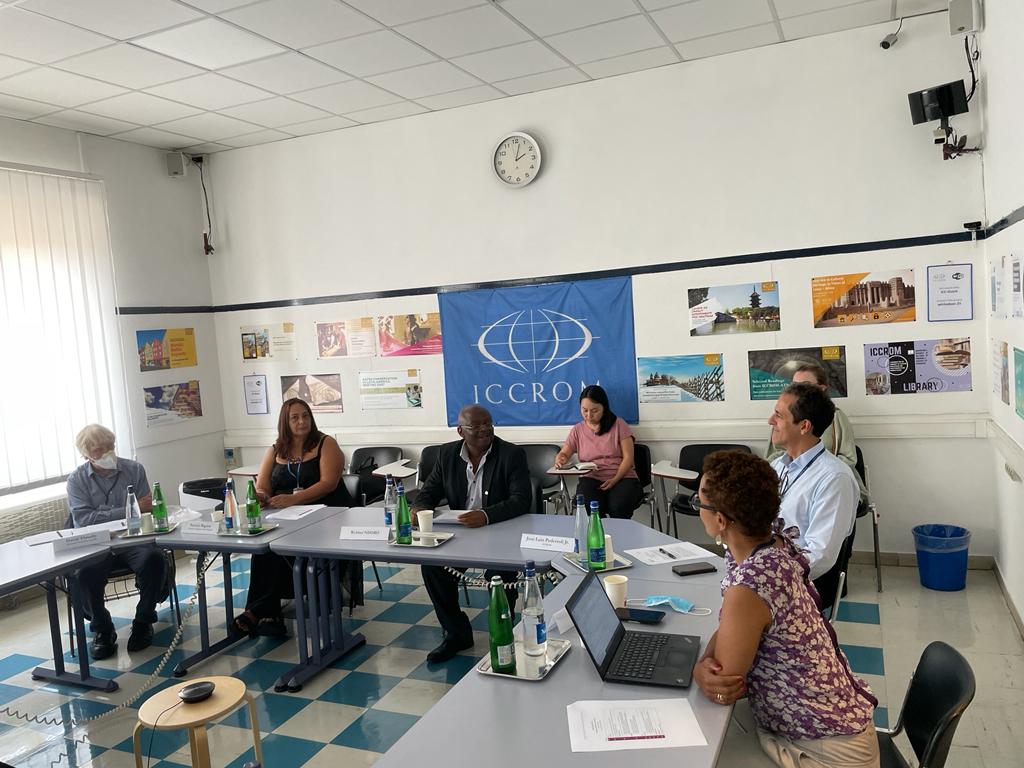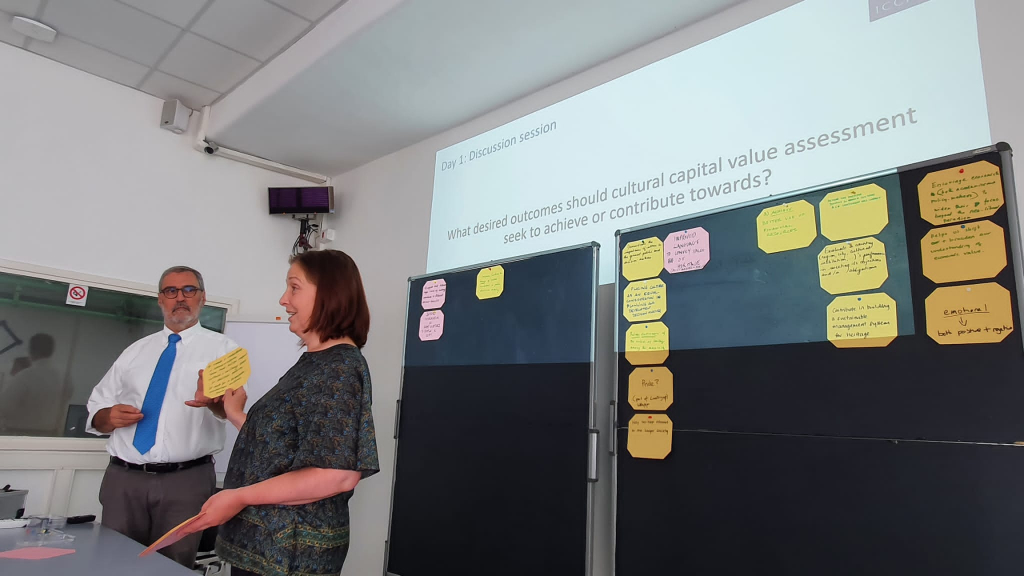ICCROM’s Valuing Cultural Capital: Accounting for the Hidden Value of Heritage initiative kicked off earlier this month with a workshop, public webinar and survey launch to our Member States.
In opening the workshop, ICCROM Director-General Webber Ndoro commented:
“Heritage has a value that cannot be conveyed with a price tag, but it is one of the things that makes life beautiful. That said, a lot of people want to know… What does heritage contribute to daily issues? How does it provide benefits to citizens today?
…We need to make sure that people understand that sustainability, climate change and conflict issues are not always solved by economic figures: they can also be solved by other values, which come from our heritage.”
This statement neatly summarizes the challenge for this initiative: to find better methods to articulate and evidence the value of heritage in terms of the manifold ways in which it contributes to improving people’s lives and strengthens communities.
Brainstorming at headquarters
With this goal in mind, in collaboration with the University of Glasgow, we convened a workshop at ICCROM headquarters to brainstorm how to enhance current methods to account for the hidden value of cultural heritage assets and their social benefits. The session brought together leading thinkers in cultural economics, including government representatives (UK, Italy), heritage agencies (Historic England, ICOMOS) and respected academics, to offer their thoughts. The event was generously supported by the Economic and Social Research Council, United Kingdom.

The meeting heard about work led by the UK Government Department for Digital, Culture Media and Sport to develop a ‘culture and heritage capital approach’ that will provide a more comprehensive and accurate articulation of the value of services provided by culture and heritage, following a welfare approach.
The meeting also heard from experts in other areas, such as environmental economics, who discussed the many parallels between natural and cultural capital and the potential to apply existing methods for valuing natural capital – which have been used successfully to contribute to policy – to the valuation of cultural capital. A particular challenge identified was the complexity of cultural heritage value due to its non-substitutability and highly variable, site-specific value.
Workshop participants also discussed philosophical questions such as the concept of wellbeing, based on Amartya Sen’s capabilities approach, and how heritage contributes to this, drawing on evidence from international case law. Other topics included the role of the private sector in heritage investment decision-making; and the challenges of performing cost-benefit analyses for cultural heritage.
 A key issue of debate was how to account for the non-market, and often non-monetizable, benefits from heritage, emphasizing that economic valuation of cultural heritage is not just about money but rather can help analyze and document the multiple ways heritage contributes to sustainability and quality of life. Participants emphasized the need for robust economic evidence as key for making the case for heritage, particularly when funding gets increasingly scarce. Moreover, they stressed the opportunities economic methods offer for clearly tracing who benefits and how – thus aiding efforts to address inequalities and deliver better outcomes for people. In doing so, cultural economics demonstrates the potential for a new breed of economics in which growth is measured not just in terms of wealth but also in welfare, looking beyond GDP to human and environmental wellbeing.
A key issue of debate was how to account for the non-market, and often non-monetizable, benefits from heritage, emphasizing that economic valuation of cultural heritage is not just about money but rather can help analyze and document the multiple ways heritage contributes to sustainability and quality of life. Participants emphasized the need for robust economic evidence as key for making the case for heritage, particularly when funding gets increasingly scarce. Moreover, they stressed the opportunities economic methods offer for clearly tracing who benefits and how – thus aiding efforts to address inequalities and deliver better outcomes for people. In doing so, cultural economics demonstrates the potential for a new breed of economics in which growth is measured not just in terms of wealth but also in welfare, looking beyond GDP to human and environmental wellbeing.
Inclusive digital discussion
The workshop concluded with a public webinar on Friday, 16 September. We were honoured to welcome distinguished speakers, including:
- Prof Luigi Fusco Girard, ICOMOS ISCEC;
- Dr Antonia Gravagnuolo, CNR, Italy;
- Dr Adala Leeson, Head of Socio-economic Analysis and Evaluation, Historic England, United Kingdom;
- Prof Patrizia Riganti, Professor in Tourism, School of Interdisciplinary Studies, the University of Glasgow, United Kingdom; and
- Prof David Throsby, Professor of Economics, Macquarie University, Australia.
Prof David Throsby – who, in 1999, was the first to apply the term “cultural capital” to this context – explained that “the notion of heritage as cultural capital absolutely does not seek to commodify heritage in any way; it seeks to expand the horizons on which we judge heritage, and how we evaluate it.” He communicated its importance, stating, “The concept of ‘cultural capital’ and interpreting heritage in these terms can have real power in terms of the analysis and the policymaking in relation to heritage.”
Dr Adala Leeson stressed the importance of having good evidence to present to policymakers – particularly those outside the heritage field. She says her team’s mantra is: “Better evidence, better decisions for the historic environment.” She added, “We’re really trying to be able to articulate in full what it is people value so that we can protect – and continue to protect – and share people’s heritage.”
The webinar also delved into the question of what heritage value is, and who gets to define it from both “expert” and “public” viewpoints (and whether these values align or diverge). It was emphasized how economic methods can provide inclusive, bottom-up approaches that can encompass this diversity.
Finally, the webinar closed with a discussion on the need for a new ‘wellbeing approach’ to heritage that builds on values-based and people-centred approaches to provide a holistic framework for assessing the value of heritage and guiding its ongoing care and use.
Calling all ICCROM Member States – a new survey!
The workshop and webinar coincide with the launch of a survey to ICCROM Member States, which was presented by Prof Patrizia Riganti.
The survey will focus on what valuation methods are currently used and how they are employed to inform public policy decisions to protect, conserve, maintain and restore cultural heritage – both immovable (built) heritage (e.g., archaeological sites and other assets) and moveable heritage (e.g., public collections).
The survey results will be presented at an international event planned for 2023.
This research is part of the Valuing Cultural Capital for Inclusive Sustainable Development project led by Prof Riganti in cooperation with ICCROM and Prof Throsby and funded by the Economic and Social Research Council, United Kingdom.
Learn more about this research and the survey.
The full recording of the webinar is available to watch here.
